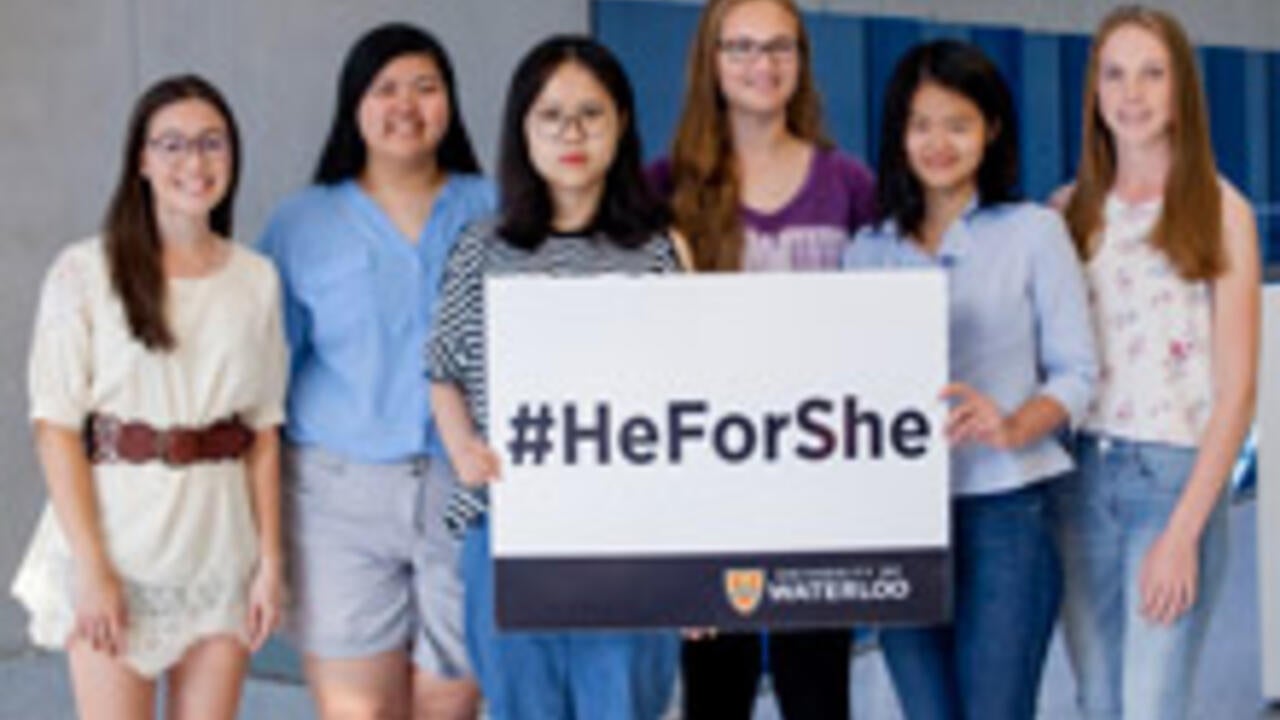
HeForShe scholarships awarded to exceptional first year STEM students
Young women pursuing science, technology, engineering, and mathematics at the University of Waterloo encouraged to follow their passions with $12,000 scholarships

Young women pursuing science, technology, engineering, and mathematics at the University of Waterloo encouraged to follow their passions with $12,000 scholarships
By Taylor Legere University Communications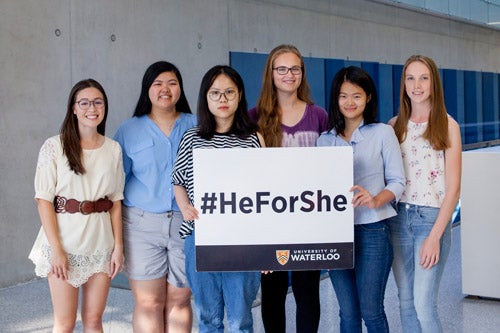 Six HeForShe IMPACT scholarships have been awarded to exceptional female students entering their first year as undergraduates in science, technology, engineering or mathematics (STEM). The scholarships are part of the University of Waterloo’s commitment to encourage more young women to pursue fields in STEM, where females are currently underrepresented.
Six HeForShe IMPACT scholarships have been awarded to exceptional female students entering their first year as undergraduates in science, technology, engineering or mathematics (STEM). The scholarships are part of the University of Waterloo’s commitment to encourage more young women to pursue fields in STEM, where females are currently underrepresented.
Waterloo is the only Canadian university taking part in the UN Women’s HeForShe IMPACT 10x10x10 initiative to achieve gender parity. As part of this initiative, the University aims increase female representation in STEM education and careers, enhance female faculty representation, and promote female leaders into senior university positions.
The 2017 recipients each have their own unique experiences that sparked their interest in STEM but they are equally as excited to take the next step towards pursuing their passions.
Jiayue Cheng – Business and Computer Science (Double Major)
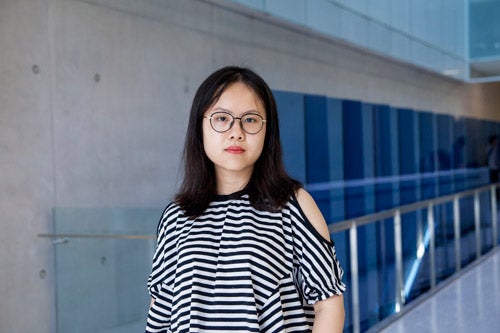 Jiayue Cheng’s love for computer science started while attending Jiangsu Tianyi High School in China when she discovered that learning programing languages allowed her to design and create. Because Cheng was already excelling in math and physics in high school, she felt that an education in STEM would play to her strengths.
Jiayue Cheng’s love for computer science started while attending Jiangsu Tianyi High School in China when she discovered that learning programing languages allowed her to design and create. Because Cheng was already excelling in math and physics in high school, she felt that an education in STEM would play to her strengths.
Cheng explains that coming from a family of engineers meant that she never thought it would be strange for a female to pursue STEM.
While Cheng’s parents didn’t shield her from the fact that females are generally a minority in STEM fields, they also emphasized the successes that women have already achieved academically and professionally in STEM.
“When I was applying for programs like computer science, mathematics and physics I didn’t feel my gender would prevent me from success in those fields. I just chose what I’m good at and interested in,” says Cheng.
Cheng stresses the importance of self-confidence and ignoring anyone who doubts your abilities or talents because of your gender.
Teresa Kang – Computer Science
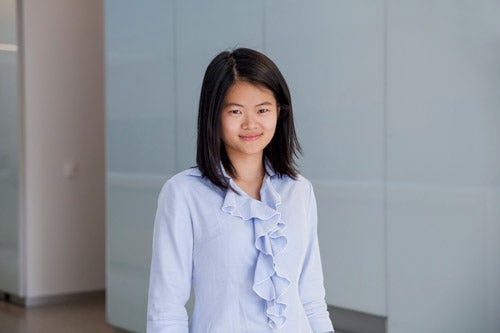 Although Teresa Kang is just starting her first year of Computer Science, the University of Waterloo has been a constant along her path to pursuing a STEM education. After her success as a Waterloo Fermat Mathematics Contest regional champion while attending Centennial High School in Calgary, Kang went on to participate in the Auckland Math Workshop at Waterloo.
Although Teresa Kang is just starting her first year of Computer Science, the University of Waterloo has been a constant along her path to pursuing a STEM education. After her success as a Waterloo Fermat Mathematics Contest regional champion while attending Centennial High School in Calgary, Kang went on to participate in the Auckland Math Workshop at Waterloo.
“Being able to meet people with such diverse backgrounds [who] share the same passion was incredible and inspiring,” says Kang about her experiences at Auckland.
Supportive parents and friendships with other young women interested in STEM also set the stage for Kang to feel comfortable and unrestricted in her studies.
Kang sees the importance in studying STEM through the power of technology to save lives, and finds inspiration in research like the ‘drinkable book’ used to filter contaminated water. She also sees STEM as a means of understanding and identifying connections in life.
“There’s a connection everywhere in life if you look for it and [that] is why it’s so fascinating,” says Kang.
Heather Musson – Software Engineering
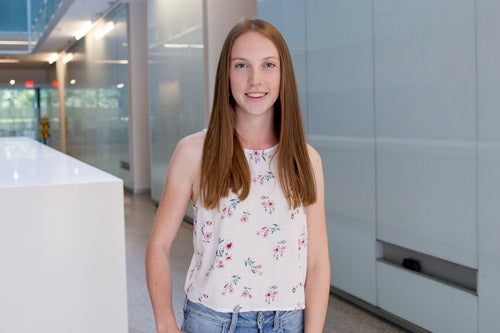 Heather Musson, who recalls learning math before learning to read, knew early on that she would excel in a STEM field. While both of her parents encouraged her to follow her passions, it was Musson’s father who suggested engineering as the perfect combination of her love for math and science.
Heather Musson, who recalls learning math before learning to read, knew early on that she would excel in a STEM field. While both of her parents encouraged her to follow her passions, it was Musson’s father who suggested engineering as the perfect combination of her love for math and science.
With support from her academic advisor and teachers at St. Mildred’s Lightbourn School, Musson was able to narrow down her interest to software engineering.
Beyond Musson’s passion for STEM, she is drawn to the flexibility of being able to work in many different fields. “Technology is everywhere,” says Musson, “almost every company uses some type of technology in their workplace”.
“Pursue something you love,” advises Musson, “Don’t worry about what obstacles you are going to encounter, because you will encounter obstacles, everyone does, but you will overcome [them].”
Musson also recommends finding passions outside of school. “Dedicating upwards of 20 hours a week to horseback riding has also really helped me with my time management and study skills.”
Guia Janelle C. Pucyutan – Mathematical Physics
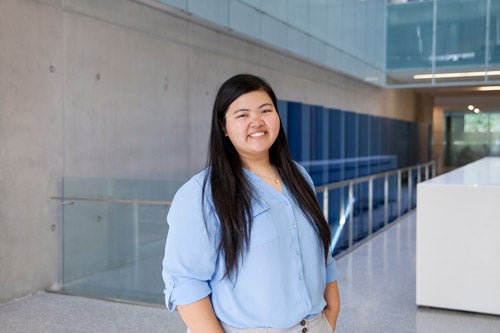 From a young age Guia Pucyutan considered her mother an example of looking beyond traditional gender roles. While Pucyutan was growing up in the Philippines, her mother worked as a mechanical engineer and taught her the importance of persevering to reach her goals.
From a young age Guia Pucyutan considered her mother an example of looking beyond traditional gender roles. While Pucyutan was growing up in the Philippines, her mother worked as a mechanical engineer and taught her the importance of persevering to reach her goals.
Pucyutan credits her mother’s support and advice to encouraging her to chase her passion for mathematics and science. She also found inspiration to pursue physical sciences from her chemistry and physics teachers at Senator O’Connor College School in Toronto, who captivated her interest through a combination of educational and practical lessons.
Pucyutan describes math and physics to be her calling and is excited to continue her studies at Waterloo before taking on a career in her field.
“Do what you love,” says Pucyutan, “I believe that one does not love something because they are good at it; they become good at it because they love it, because they enjoy just immersing themselves in it.”
Alex Rynard – Mathematical Physics
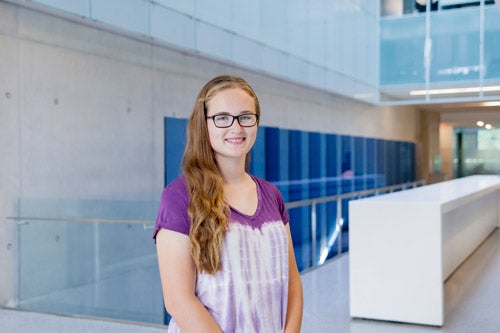 Alex Rynard credits her experience of being continuously challenged and encouraged by her science and math teachers as instrumental in developing her curiosity in STEM.
Alex Rynard credits her experience of being continuously challenged and encouraged by her science and math teachers as instrumental in developing her curiosity in STEM.
“The feeling of being engaged, secure and comfortable in those classrooms from a young age really sparked my interest in science and mathematics,” says Rynard.
But Rynard’s interest in STEM goes further than mere curiosity; she wants to pursue a career and education in STEM because it is simply what she loves to do. She can’t imagine pursuing any other field.
“Be involved with what really interests you,” Rynard advises to other young women, “…it does not matter what other people do or say if you are truly doing something you enjoy.”
Specifically, Rynard is interested in mathematical physics and found Waterloo appealing for its co-op program. “I hope that being in co-op will allow me to experience some potential career options and find an exciting career,” says Rynard.
Christina Sullivan – Mechatronics Engineering
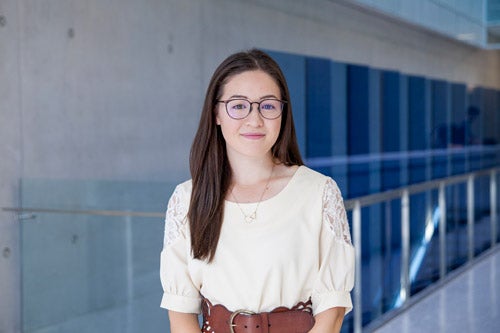 Seeing how engineering degrees opened doors for her parents and siblings encouraged Christina Sullivan to study engineering as well.
Seeing how engineering degrees opened doors for her parents and siblings encouraged Christina Sullivan to study engineering as well.
“Hearing [about] all of the incredible new innovations and tech that are being worked on and released…was a really big push for me to pursue a career engineering,” says Sullivan, “I became passionate for real world practical applications; physical tools, processes, and devices that are designed to help people and advance the human condition.”
Sullivan is incredibly future focused and aware that digital technology is continuing to be integrated into our lives. She also thinks that the co-op program at Waterloo — in combination with her digital knowledge — will be a valuable experience.
“I decided to apply to the mechatronics engineering program because it integrates hardware with software,” says Sullivan, “While digital is important, humans still need to interact with the physical world.”
Sullivan recommends other young women with an interest in STEM to ensure they take the classes they need to meet admission requirements early in high school and to try to be involved with groups outside of academics. When Sullivan isn’t studying she enjoys playing field hockey for the Waterloo varsity team.

Read more
Here are the people and events behind some of this year’s most compelling Waterloo stories

Read more
Meet five exceptional Waterloo graduate students crossing the convocation stage as Class of 2025 valedictorians
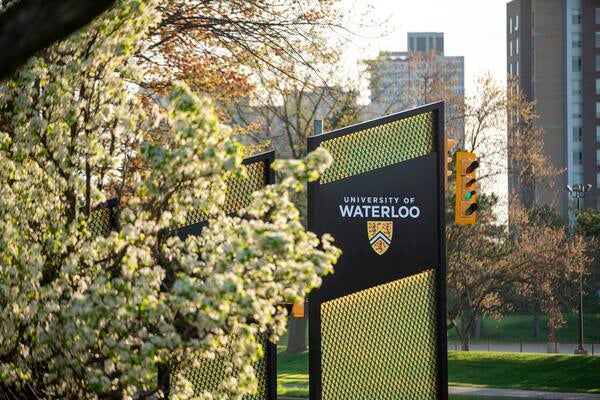
Read more
The 2025 cohort represents some of the brightest new entrepreneurial minds in STEM
The University of Waterloo acknowledges that much of our work takes place on the traditional territory of the Neutral, Anishinaabeg, and Haudenosaunee peoples. Our main campus is situated on the Haldimand Tract, the land granted to the Six Nations that includes six miles on each side of the Grand River. Our active work toward reconciliation takes place across our campuses through research, learning, teaching, and community building, and is co-ordinated within the Office of Indigenous Relations.